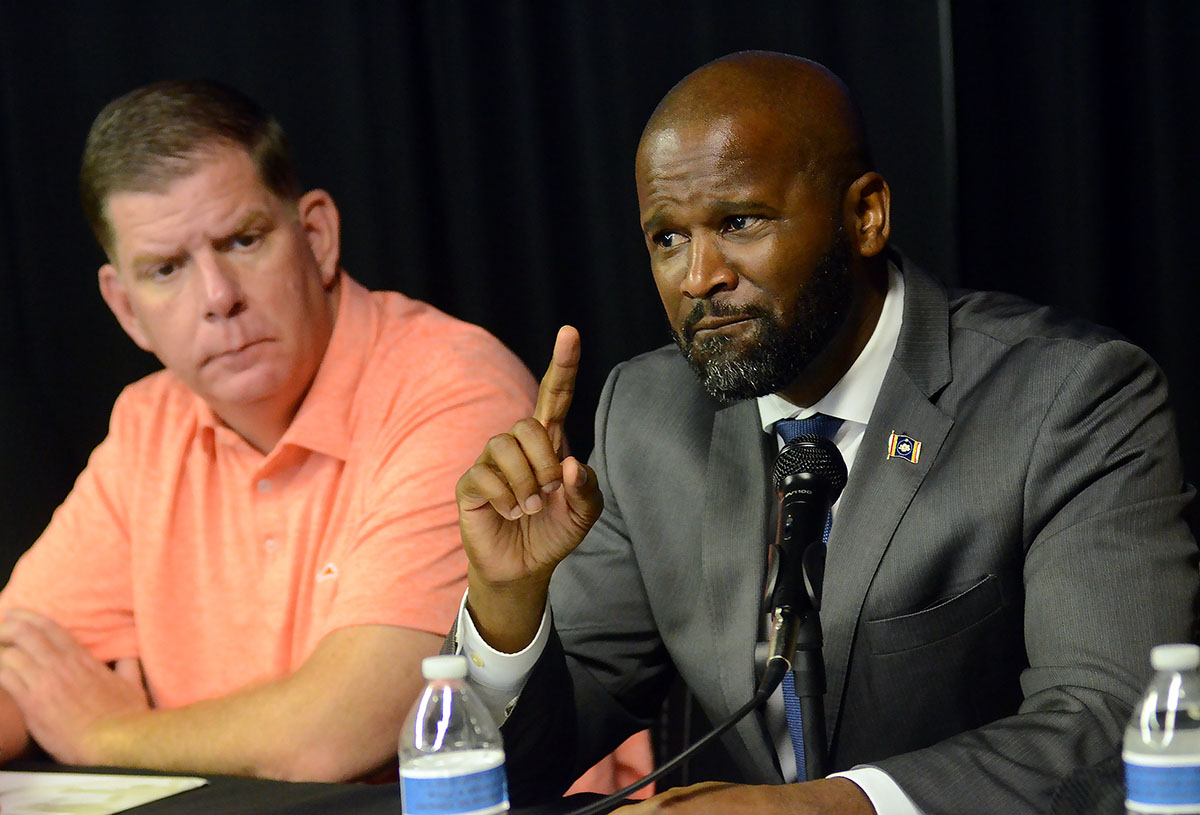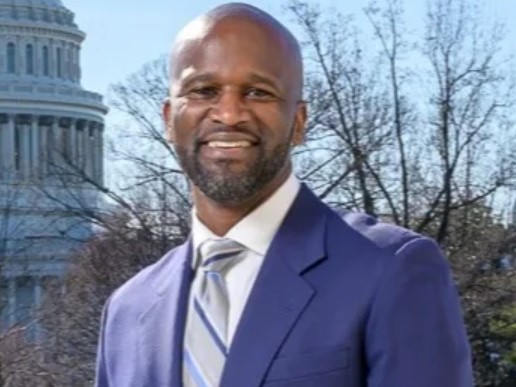Mississippi Today
Ty Pinkins, Army veteran and Delta advocate, announces U.S. Senate run

Ty Pinkins, Army veteran and Delta advocate, announces U.S. Senate run
Ty Pinkins, the Army veteran and Delta advocate who fought against racist pay for Mississippi farm workers, announced Tuesday he will run against incumbent Sen. Roger Wicker for a seat in the U.S. Senate in 2024 as a Democrat.
Formerly a lawyer with the Mississippi Center for Justice, Pinkins spent much of the last two years aiding Black farmer workers in the Delta who were being paid less money for their work than white visa workers from South Africa doing the same jobs.
Pinkins, 48, said he’s alarmed that the state’s local and federal representation hasn’t responded to workers’ plights in the Delta — even after Pinkins testified before Congress in July on the topic.
“For the last two-and-a-half years, I’ve been working with local farmers,” he told Mississippi Today. “It was uncovered that local workers were not only being underpaid but underpaid in violation of federal law.”
A Mississippi Today investigation — and investigations by the Department of Labor — found several Mississippi farms were paying local Black workers less money per hour than visa workers, primarily white men from South Africa. Pinkins has helped Black workers get more than $1 million back in lost wages through lawsuits, according to the Mississippi Center for Justice.
Despite U.S. Secretary of Labor Marty Walsh’s visit to the Delta to learn about racist pay and hiring practices, Pinkins said he hasn’t “heard a peep” from any elected officials in Mississippi outside Congressman Bennie Thompson.
“You’re in that job to make sure the people of Mississippi are being treated fairly,” he said. “I’m frustrated that’s not happening.”
Pinkins acknowledged the challenge of running against Wicker, a Republican who has held his seat in the U.S. Senate since 2007.

He said he wants to be the voice of Mississippians, adopting the campaign motto of “You talk. I listen. We do.”
Pinkins grew up in the Delta. He said he chopped cotton as a boy in Rolling Fork as his family struggled in poverty, often living in run-down homes without bathrooms. He served in the U.S. Army for 21 years and went on to receive his law degree from Georgetown.
He now lives with his wife and two children in Vicksburg.
Pinkins said he wants to raise the federal minimum wage to $15 an hour, protect women’s reproductive rights and grow access to both education and health care, including Medicaid expansion.
“I am excited to announce my candidacy for the U.S. Senate. I am running because I am concerned about the direction in which our country is going,” Pinkins said in a statement. “My educational, military, and professional qualifications are perfectly suited to meet this precarious moment our state and our country faces, and ensure that our democratic ideals endure and prevail for future generations.”
This article first appeared on Mississippi Today and is republished here under a Creative Commons license.
Mississippi Today
On this day in 1903, W.E.B. Du Bois urged active resistance to racist policies
April 27, 1903

W.E.B. Du Bois, in his book, “The Souls of Black Folk,” called for active resistance to racist policies: “We have no right to sit silently by while the inevitable seeds are sown for a harvest of disaster to our children, black and white.”
He described the tension between being Black and being an American: “One ever feels his twoness, — an American, a Negro; two souls, two thoughts, two unreconciled strivings; two warring ideals in one dark body, whose strength alone keeps it from being torn asunder.”
He criticized Washington’s “Atlanta Compromise” speech. Six years later, Du Bois helped found the NAACP and became the editor of its monthly magazine, The Crisis. He waged protests against the racist silent film “The Birth of a Nation” and against lynchings of Black Americans, detailing the 2,732 lynchings between 1884 and 1914.
In 1921, he decried Harvard University’s decisions to ban Black students from the dormitories as an attempt to renew “the Anglo-Saxon cult, the worship of the Nordic totem, the disenfranchisement of Negro, Jew, Irishman, Italian, Hungarian, Asiatic and South Sea Islander — the world rule of Nordic white through brute force.”
In 1929, he debated Lothrop Stoddard, a proponent of scientific racism, who also happened to belong to the Ku Klux Klan. The Chicago Defender’s front page headline read, “5,000 Cheer W.E.B. DuBois, Laugh at Lothrup Stoddard.”
In 1949, the FBI began to investigate Du Bois as a “suspected Communist,” and he was indicted on trumped-up charges that he had acted as an agent of a foreign state and had failed to register. The government dropped the case after Albert Einstein volunteered to testify as a character witness.
Despite the lack of conviction, the government confiscated his passport for eight years. In 1960, he recovered his passport and traveled to the newly created Republic of Ghana. Three years later, the U.S. government refused to renew his passport, so Du Bois became a citizen of Ghana. He died on Aug. 27, 1963, the eve of the March on Washington.
This article first appeared on Mississippi Today and is republished here under a Creative Commons Attribution-NoDerivatives 4.0 International License.![]()
Mississippi Today
Jim Hood’s opinion provides a roadmap if lawmakers do the unthinkable and can’t pass a budget
On June 30, 2009, Sam Cameron, the then-executive director of the Mississippi Hospital Association, held a news conference in the Capitol rotunda to publicly take his whipping and accept his defeat.
Cameron urged House Democrats, who had sided with the Hospital Association, to accept the demands of Republican Gov. Haley Barbour to place an additional $90 million tax on the state’s hospitals to help fund Medicaid and prevent the very real possibility of the program and indeed much of state government being shut down when the new budget year began in a few hours. The impasse over Medicaid and the hospital tax had stopped all budget negotiations.
Barbour watched from a floor above as Cameron publicly admitted defeat. Cameron’s decision to swallow his pride was based on a simple equation. He told news reporters, scores of lobbyists and health care advocates who had set up camp in the Capitol as midnight on July 1 approached that, while he believed the tax would hurt Mississippi hospitals, not having a Medicaid budget would be much more harmful.
Just as in 2009, the Legislature ended the 2025 regular session earlier this month without a budget agreement and will have to come back in special session to adopt a budget before the new fiscal year begins on July 1. It is unlikely that the current budget rift between the House and Senate will be as dramatic as the 2009 standoff when it appeared only hours before the July 1 deadline that there would be no budget. But who knows what will result from the current standoff? After all, the current standoff in many ways seems to be more about political egos than policy differences on the budget.
The fight centers around multiple factors, including:
- Whether legislation will be passed to allow sports betting outside of casinos.
- Whether the Senate will agree to a massive projects bill to fund local projects throughout the state.
- Whether leaders will overcome hard feelings between the two chambers caused by the House’s hasty final passage of a Senate tax cut bill filled with typos that altered the intent of the bill without giving the Senate an opportunity to fix the mistakes.
- Whether members would work on a weekend at the end of the session. The Senate wanted to, the House did not.
It is difficult to think any of those issues will rise to the ultimate level of preventing the final passage of a budget when push comes to shove.
But who knows? What we do know is that the impasse in 2009 created a guideline of what could happen if a budget is not passed.
It is likely that parts, though not all, of state government will shut down if the Legislature does the unthinkable and does not pass a budget for the new fiscal year beginning July 1.
An official opinion of the office of Attorney General Jim Hood issued in 2009 said if there is no budget passed by the Legislature, those services mandated in the Mississippi Constitution, such as a public education system, will continue.
According to the Hood opinion, other entities, such as the state’s debt, and court and federal mandates, also would be funded. But it is likely that there will not be funds for Medicaid and many other programs, such as transportation and aspects of public safety that are not specifically listed in the Mississippi Constitution.
The Hood opinion reasoned that the Mississippi Constitution is the ultimate law of the state and must be adhered to even in the absence of legislative action. Other states have reached similar conclusions when their legislatures have failed to act, the AG’s opinion said.
As is often pointed out, the opinion of the attorney general does not carry the weight of law. It serves only as a guideline, though Gov. Tate Reeves has relied on the 2009 opinion even though it was written by the staff of Hood, who was Reeves’ opponent in the contentious 2019 gubernatorial campaign.
But if the unthinkable ever occurs and the Legislature goes too far into a new fiscal year without adopting a budget, it most likely will be the courts — moreso than an AG’s opinion — that ultimately determine if and how state government operates.
In 2009 Sam Cameron did not want to see what would happen if a budget was not adopted. It also is likely that current political leaders do not want to see the results of not having a budget passed before July 1 of this year.
This article first appeared on Mississippi Today and is republished here under a Creative Commons Attribution-NoDerivatives 4.0 International License.
Mississippi Today
1964: Mississippi Freedom Democratic Party was formed
April 26, 1964

Civil rights activists started the Mississippi Freedom Democratic Party to challenge the state’s all-white regular delegation to the Democratic National Convention.
The regulars had already adopted this resolution: “We oppose, condemn and deplore the Civil Rights Act of 1964 … We believe in separation of the races in all phases of our society. It is our belief that the separation of the races is necessary for the peace and tranquility of all the people of Mississippi, and the continuing good relationship which has existed over the years.”
In reality, Black Mississippians had been victims of intimidation, harassment and violence for daring to try and vote as well as laws passed to disenfranchise them. As a result, by 1964, only 6% of Black Mississippians were permitted to vote. A year earlier, activists had run a mock election in which thousands of Black Mississippians showed they would vote if given an opportunity.
In August 1964, the Freedom Party decided to challenge the all-white delegation, saying they had been illegally elected in a segregated process and had no intention of supporting President Lyndon B. Johnson in the November election.
The prediction proved true, with white Mississippi Democrats overwhelmingly supporting Republican candidate Barry Goldwater, who opposed the Civil Rights Act. While the activists fell short of replacing the regulars, their courageous stand led to changes in both parties.
This article first appeared on Mississippi Today and is republished here under a Creative Commons Attribution-NoDerivatives 4.0 International License.![]()
-

 News from the South - Florida News Feed7 days ago
News from the South - Florida News Feed7 days agoJim talks with Rep. Robert Andrade about his investigation into the Hope Florida Foundation
-

 News from the South - Florida News Feed5 days ago
News from the South - Florida News Feed5 days agoTrump touts manufacturing while undercutting state efforts to help factories
-

 News from the South - Alabama News Feed5 days ago
News from the South - Alabama News Feed5 days agoPrayer Vigil Held for Ronald Dumas Jr., Family Continues to Pray for His Return | April 21, 2025 | N
-

 Mississippi Today6 days ago
Mississippi Today6 days ago‘Trainwreck on the horizon’: The costly pains of Mississippi’s small water and sewer systems
-

 News from the South - Texas News Feed6 days ago
News from the South - Texas News Feed6 days agoMeteorologist Chita Craft is tracking a Severe Thunderstorm Warning that's in effect now
-

 News from the South - Missouri News Feed1 day ago
News from the South - Missouri News Feed1 day agoMissouri lawmakers on the cusp of legalizing housing discrimination
-

 News from the South - Virginia News Feed6 days ago
News from the South - Virginia News Feed6 days agoTaking video of military bases using drones could be outlawed | Virginia
-

 News from the South - Arkansas News Feed7 days ago
News from the South - Arkansas News Feed7 days agoAs country grows more polarized, America needs unity, the ‘Oklahoma Standard,’ Bill Clinton says














































